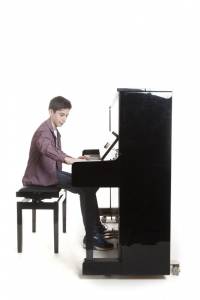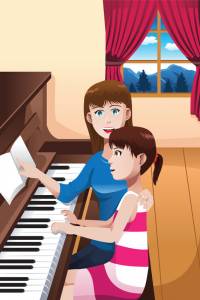 Learning a musical instrument is hard work, time consuming too. Put in those terms, it is amazing that anybody learns instruments, especially today when there are so many wonderful and exciting distractions. However, I firmly believe that learning a musical instrument is fun. Even now after playing the piano for 40 years I still get a buzz from figuring out something new and overcoming challenges in a piece of music. I get the same feeling when I see my piano pupils overcoming their piano hurdles too.
Learning a musical instrument is hard work, time consuming too. Put in those terms, it is amazing that anybody learns instruments, especially today when there are so many wonderful and exciting distractions. However, I firmly believe that learning a musical instrument is fun. Even now after playing the piano for 40 years I still get a buzz from figuring out something new and overcoming challenges in a piece of music. I get the same feeling when I see my piano pupils overcoming their piano hurdles too.
Nevertheless, it can be a challenge to get younger piano pupils to practice. The sooner a practice routine has been established, the sooner a pupil will start to find success. I hope that the following will be of help to parents and pupils.
 Setting a time for practice and for how long may help. In the early stages it doesn’t have to be for very long, 5 minutes every day can be enough for very young children. This can be built up as they progress. The set length of time can really help focus energies in the practice, bring about more progress and have a greater sense of accomplishment.
Setting a time for practice and for how long may help. In the early stages it doesn’t have to be for very long, 5 minutes every day can be enough for very young children. This can be built up as they progress. The set length of time can really help focus energies in the practice, bring about more progress and have a greater sense of accomplishment.
Have a goal for the practice. It can be motivating to have a goal to aim for and help keep the practice as efficient as possible. It might be on say Monday to figure out the first phrase of a piece without stopping due to a mistake, the goal for Tuesday could be to play the second phrase. This accumulates and by the end of the week the child will be able to play the whole piece. That is a great motivator and the sense of accomplishment surely adds to the enjoyment.
 It might be helpful to have the teacher set goals for each practice. However it is important for the child to try to figure out what feels possible in each practice too. Self-directed learning is an essential life skill.
It might be helpful to have the teacher set goals for each practice. However it is important for the child to try to figure out what feels possible in each practice too. Self-directed learning is an essential life skill.
Parental involvement is also essential. In the early stages sitting with your child really helps encourage children get started. Later on it might just be reminding the child to practice. 
Being an audience for your child allowing them to show off followed by enthusiastic cheers is also a great motivator. Make sure to praise the effort, not just the end result. Praising the effort rewards the attempt and encourages your child to keep trying.
Get music that children are keen to play. Buy anthologies of music that the child can browse, so they can get excited by the music. I mix up styles when teaching, from classical music to jazz styles, songs from shows, film music and music from computor games.
 Make it easy for a child to practice and avoid having the piano in an isolated spot. I had a pupil who enjoyed his lessons but was reluctant to practice. The parents moved the piano to the kitchen where the family gathered. It hasn’t been great for the piano, it now has a fair few chips on the casework and in the long term the greater moisture of the air isn’t ideal. However their son practices the piano everyday and makes huge progress.
Make it easy for a child to practice and avoid having the piano in an isolated spot. I had a pupil who enjoyed his lessons but was reluctant to practice. The parents moved the piano to the kitchen where the family gathered. It hasn’t been great for the piano, it now has a fair few chips on the casework and in the long term the greater moisture of the air isn’t ideal. However their son practices the piano everyday and makes huge progress.
Inevitably all children have a favourite piece they go back to. They go back to these because they enjoy playing them. And don’t forget, new pieces which feel difficult now could soon become the next favourites….


Add Comment